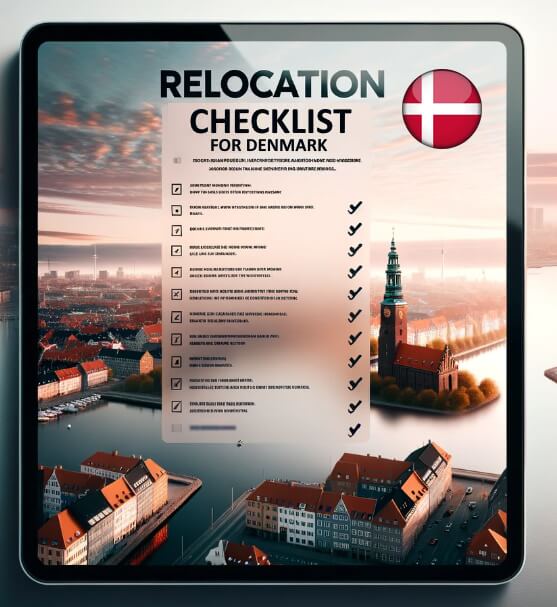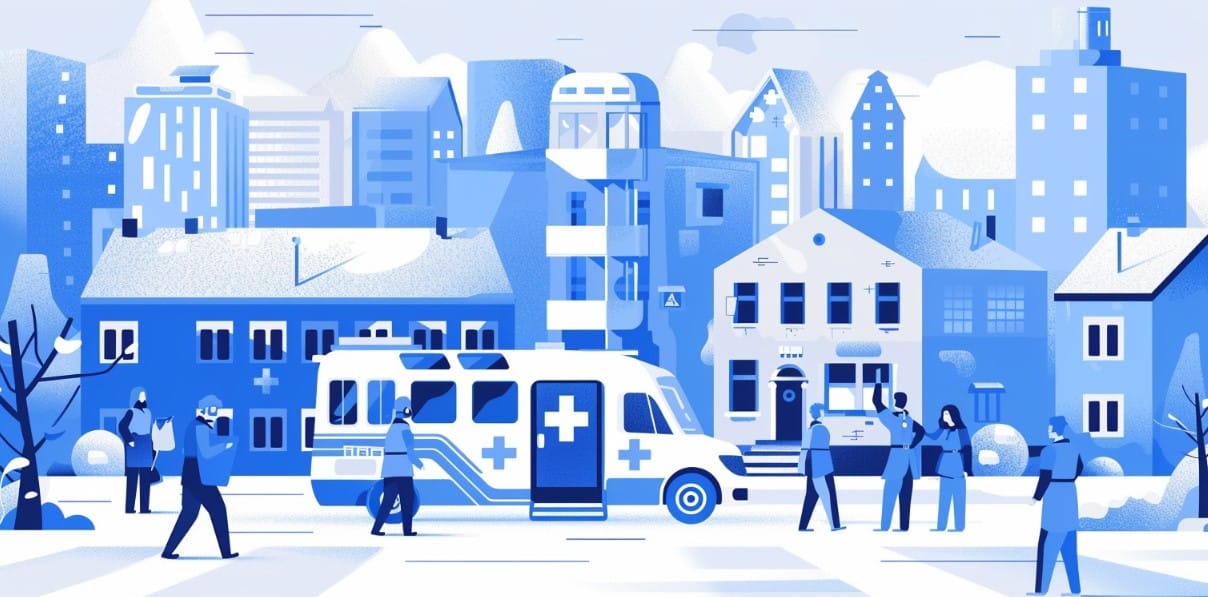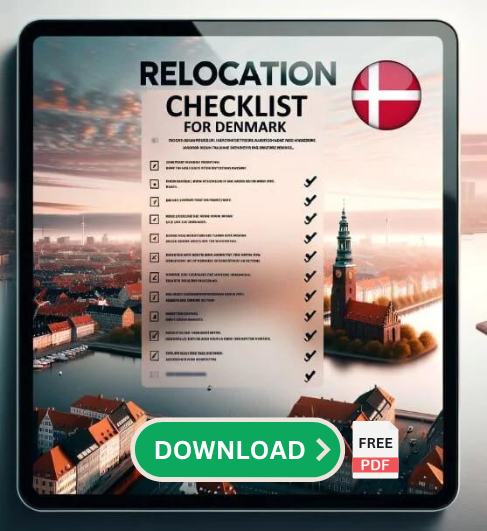In the midst of the excitement that comes with exploring or relocating to a new country like Denmark, it's easy to overlook some vital details. One of these details is knowing the emergency numbers to call when in need of immediate assistance. Whether you're a tourist, an international student, or an expat, having this knowledge is not only essential but could be lifesaving.
This article aims to provide you with a comprehensive guide on Denmark's emergency numbers. Our goal is to ensure you're equipped with clear, easy-to-understand information that will come in handy during any unforeseen circumstances. While we hope you'll never have to use this information, it's always better to be prepared.
EMERGENCY NUMBERS
- 112: The primary emergency number for all serious, life-threatening situations.
- 1813: For urgent but non-life-threatening medical situations.
- 114: Non-emergency police inquiries.
- Giftlinjen (82 12 12 12): Poison hotline.
- Psykiatrisk Rådgivning (1813): Mental health emergencies.
Understanding Denmark's Emergency System
The Danish emergency system is designed to respond promptly and efficiently to all types of emergencies, ensuring the safety and well-being of residents and visitors alike. It's a well-coordinated network involving various institutions like the police, fire department, and medical services, all working together to safeguard the community.
At its core, the emergency system in Denmark relies on specific emergency numbers that citizens can dial to reach the appropriate services. Understanding these numbers and when to use them can make a substantial difference in the event of an emergency.
In Denmark, the emergency numbers are few, but they cover the whole range of situations you might encounter. From health crises to safety threats, these numbers connect you directly to professionals trained to handle your situation.
So, whether you're a tourist visiting Denmark's many beautiful sights, an international student here for your studies, or an expat starting a new phase of your life in this Scandinavian haven, understanding Denmark's emergency system is a vital part of living or traveling here.


Emergency Numbers in Denmark
In Denmark, there are two main emergency numbers you need to be aware of. Understanding the specific uses of each can help you respond appropriately in different situations.
- 112: This is the primary emergency number in Denmark. It should be dialed in any severe, life-threatening situations where you require immediate assistance. This number is applicable for any emergency, including fire, serious accidents, violent crimes, or serious health emergencies. It's the equivalent of the "911" number in North America, and it's also used throughout the European Union.
- 1813: This number is for urgent, but non-life-threatening medical situations. If you need medical assistance but it's not an immediate life-or-death situation, dial 1813. This might include sudden illness or injuries that require urgent care, but not immediate hospitalization.
In addition to these two critical numbers, Denmark also has other emergency and service numbers that could be useful to know:
- 114: This is the number to call for non-emergency police inquiries. If you need to report a crime that is not currently happening or need to get in touch with the police for non-urgent matters, dial this number.
- Giftlinjen (82 12 12 12): This is the Danish poison hotline. If someone has ingested a potentially harmful substance or is experiencing adverse effects from a bite or sting, you can call this number for advice.
- Psykiatrisk Rådgivning (1813): For mental health emergencies, you can call the same number as for medical issues, 1813.
These numbers have been set up to provide immediate help and support when you most need it.
When to Use Emergency Numbers
Knowing when to call each emergency number is critical. Dialing the wrong number can cause unnecessary delays in response times and may even incur legal consequences. Here are some guidelines to help you understand when to use each number.
112: Use this number when you or someone else is in immediate danger or has a serious injury. This includes situations like fires, serious road accidents, violent crimes, or critical health emergencies. Essentially, if a life is at risk, call 112.
1813: Call this number for urgent but non-life-threatening medical situations. This could be a sudden illness or injury that requires attention but is not immediately life-threatening. It is also the number to call for mental health crises.
114: This is the number for non-emergency police inquiries. If you've been a victim of a non-violent crime, like theft, or you need to report something to the police that does not require immediate attention, use this number.
82 12 12 12 (Giftlinjen): If you suspect poisoning, whether it's from ingesting a toxic substance or from a bite or sting, dial this number for professional advice.
Remember, misuse of emergency numbers is a serious offense and can result in penalties. These numbers should not be used for non-emergency situations or for general inquiries. Always make sure your call is appropriate for the number you are dialing.
If you believe a situation is an emergency, do not hesitate to dial 112. It's better to be safe than sorry. Your safety, and the safety of those around you, is paramount.
How to Dial Emergency Numbers
In the event of an emergency, knowing how to correctly dial emergency numbers can be crucial. Here's how to do it:
If you're using a Danish phone, dial the emergency number required. No additional codes or prefixes are necessary.
If you're using a foreign phone, you still need to dial the emergency number directly. Even if your phone is from outside the European Union, it should automatically reroute the call to the local emergency services when you dial an internationally recognized emergency number like 112.
These emergency numbers can be dialed for free from any phone, including payphones and mobile phones without a SIM card. Remember that these calls should only be made in true emergencies, as misuse of the service can lead to penalties.
Related: Everything you need to know about travel insurance in Denmark
What to Say on an Emergency Call
During an emergency call, it's crucial to communicate clearly and effectively. Here's a guide on what you should say when connected with an emergency operator:
- State the type of emergency: Begin by briefly explaining the situation. Whether it's a fire, a medical emergency, or a crime, stating this upfront helps the operator understand what type of assistance is needed.
- Give your location: It's essential to provide your exact location, including the street name and number, nearby landmarks, or any other information that can help emergency services find you quickly. If you're indoors, also specify the floor and room number if applicable.
- Describe the situation in more detail: After stating the type of emergency and your location, give more information about the situation. For example, describe the condition of a person in need of medical assistance, how big a fire is, or what the perpetrator of a crime looks like.
- Follow the operator's instructions: The operator may ask additional questions or give you instructions. Be sure to listen carefully and answer as best as you can.
- Do not hang up until instructed to do so: The operator may need more information or might give additional advice. Stay on the line until they tell you it's okay to hang up.
While Danish is the official language, emergency operators in Denmark are typically able to assist in English. However, it can be useful to know a few basic Danish phrases for an emergency:
- "Hjælp" means "Help".
- "Jeg har brug for en ambulance" means "I need an ambulance".
- "Der er en brand" means "There is a fire".
- "Jeg er i fare" means "I am in danger".
Remember, clarity is key during an emergency call. Try to stay as calm as possible, speak clearly, and provide all the necessary information.
Non-Emergency Numbers and Services
While knowing emergency numbers is vital, it's equally important to be aware of non-emergency numbers and services. Here's a rundown of these services:
- 114: This is the non-emergency police number. Use it for situations that require police attention but are not immediate threats to life or property. This includes reporting a crime that has already happened, such as theft or vandalism.
- Lægevagten: If you need non-urgent medical advice outside regular office hours, you can contact the medical helpline, also known as "Lægevagten", at the same number you would call for non-life-threatening medical situations: 1813.
- Dental emergencies: For dental issues requiring immediate attention, call "Tandlægevagten" on 70 25 77 11 in Copenhagen and 35 38 02 51 in Aarhus.
- Pharmacies: For minor medical issues or advice regarding medication, local pharmacies ("apotek") are a good starting point. Some pharmacies are open 24/7, such as Steno Apotek in Aarhus and Copenhagen.
These numbers are intended for non-urgent situations. They should not be used as alternatives to the emergency numbers. Misuse can lead to delays for those in real need of these services.
Tips for Foreigners
If you're a foreigner in Denmark, understanding the local norms and nuances related to emergency services can help you navigate the system more effectively. Here are some tips to consider:
- Emergency Text Messages (112 SMS): For people who are deaf, hard of hearing, or speech impaired, Denmark has a 112 SMS service. This service requires prior registration, which can be done on the 112 website. Note, however, that this service is not intended for people who can use the regular 112 voice call service.
- Respect for Emergency Services: Danish society places great importance on the efficient functioning of emergency services. Misuse of emergency numbers is not only illegal but is also considered socially irresponsible. Only call the emergency services when truly necessary.
- Trust in the System: The Danish emergency services are highly efficient and reliable. Trust that they will respond appropriately and rapidly when called upon.
- Prepare Beforehand: Familiarize yourself with the key Danish phrases mentioned earlier and store all the essential numbers on your phone. Knowing what to say and which number to call can save valuable time in an emergency.
- European Health Insurance Card (EHIC): If you're a European Union (EU) citizen, make sure to have your EHIC with you during your stay in Denmark. It entitles you to state-provided healthcare under the same conditions and at the same cost as Danish citizens.
- Keep Identification On You: Always carry some form of identification with you, such as your passport or residence permit. This will be useful in a variety of situations, including emergencies.
FAQ
What is the 911 number in Denmark?
The equivalent of the 911 emergency number in Denmark is 112. This number should be dialed for any severe, life-threatening emergencies.
What is 1813 in Denmark?
The number 1813 in Denmark is for urgent but non-life-threatening medical situations. It covers sudden illnesses or injuries that require urgent care but aren't immediate threats to life.
What is the number 114 in Denmark?
The number 114 in Denmark is the non-emergency police number. It's used for reporting non-urgent matters to the police, such as crimes that have already occurred and aren't immediate threats.



![New to Denmark: Complete English Guide ([year]) New to Denmark](https://denmarkexpat.com/wp-content/uploads/2024/05/New-to-Denmark-150x150.jpg)
![Housing in Denmark [year]: Complete Guide to Renting & Buying housing in denmark1](https://denmarkexpat.com/wp-content/uploads/2024/05/housing-in-denmark1-150x150.jpg)
![Immigration to Denmark: How To Immigrate to Denmark in [year] Immigration to Denmark](https://denmarkexpat.com/wp-content/uploads/2023/09/Immigration-to-Denmark-150x150.jpg)
